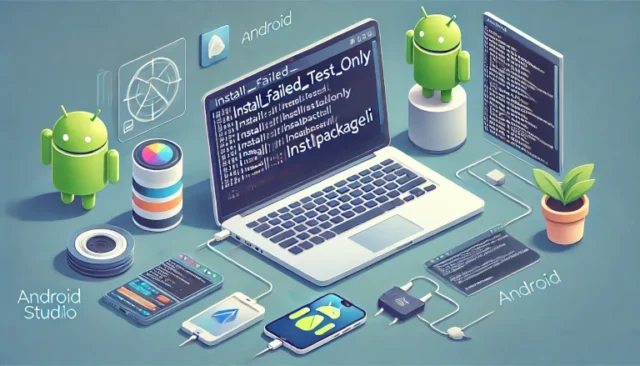Encountering the INSTALL_FAILED_TEST_ONLY: installPackageLI error in Android can be a frustrating experience, especially for developers working with test builds or custom APK installations. This error typically arises when attempting to install an APK marked as testOnly without proper permissions or settings. In this comprehensive guide, we’ll explore what causes this issue, how it works, and the exact steps to resolve it. Whether you’re a beginner or an experienced developer, this guide will help you eliminate this error and smoothly install your applications.
What is INSTALL_FAILED_TEST_ONLY?
The INSTALL_FAILED_TEST_ONLY error occurs when an APK flagged as testOnly is being installed on a device without enabling the required installation flags. The testOnly property is commonly used for testing purposes, ensuring the app cannot be installed through regular means, thus avoiding accidental installations in production environments.
This error usually looks like:
Failure [INSTALL_FAILED_TEST_ONLY: installPackageLI]
It is a safeguard to prevent test builds from being installed like production-ready apps.
How Does it Work?
The testOnly attribute in the AndroidManifest.xml plays a critical role in this error. When set to true, the app is treated as a test-only build. This restricts installations unless specific flags are used during the installation process.
Here’s an example of the testOnly attribute:
<application
android:label="Test App"
android:testOnly="true">
</application>
When this attribute is present, the system enforces additional checks during installation, ensuring the app is not installed through standard methods.
How to Resolve INSTALL_FAILED_TEST_ONLY
1. Remove the testOnly Attribute from the Manifest
To eliminate the error at its root, remove or modify the android:testOnly="true" attribute from the AndroidManifest.xml. Open your manifest file and ensure the testOnly attribute is either removed or set to false.
<application
android:label="Test App">
</application>
Rebuild your APK after making these changes to reflect the updates.
2. Use ADB Commands with the Correct Flags
If modifying the testOnly attribute is not feasible, you can bypass the restriction by using ADB (Android Debug Bridge). Use the -t flag during installation to explicitly allow test-only APKs:
adb install -t your-app.apk
This command forces the installation of test-only APKs on your device.
3. Disable the testOnly Property During Build
Another approach is to disable the testOnly flag at build time. Check your Gradle configuration and ensure the build type does not enforce test-only behavior. Update your build.gradle file if necessary:
android {
buildTypes {
debug {
testCoverageEnabled false
}
}
}
Rebuild the project using Gradle after applying these changes.
Common Issues and Solutions
One common issue developers face is forgetting to include the -t flag when installing test-only APKs. Always double-check your ADB command syntax to ensure it includes the required flag.
If removing the testOnly attribute does not resolve the issue, confirm that the APK you’re trying to install is indeed the latest build. Clear previous versions of the app from the device to avoid conflicts using:
adb uninstall com.example.testapp
Another potential issue is related to build caching. If changes to the manifest or Gradle configurations are not reflected, clean the project and rebuild it:
./gradlew clean build
Why This Error Happens and How to Avoid It
The INSTALL_FAILED_TEST_ONLY error exists to protect developers and users from accidentally deploying test builds in unintended environments. While it may seem inconvenient during development, it’s a valuable safeguard. To avoid this error in the future, always verify the testOnly attribute in your manifest and double-check your installation commands.
Final Thoughts
Debugging and resolving the INSTALL_FAILED_TEST_ONLY error doesn’t have to be a roadblock. With a clear understanding of its causes and the actionable solutions provided here, you can swiftly address the issue and continue your development process. Whether you modify the manifest, use ADB commands, or adjust your build configurations, the steps outlined in this guide ensure you can install your APKs without any hiccups.

Thank you! That helped me a lot!